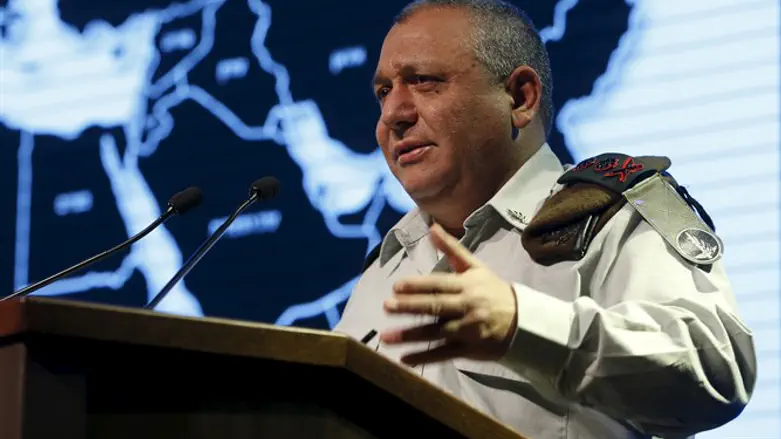
Chief of Staff Gadi Eisenkot spoke Tuesday at the Herzliya Interdisciplinary Center (IDC) and stated that the changes made in the IDF regarding religious matters over the past year were made with the goal of unifying and strengthening solidarity within the IDF.
Eisenkot stated that the goal of the military is to "protect the country, ensure its existence and to win wars. All other aspects are designed to support the main goal. The matter of the "people's army" [an army comprised of different types of people from diverse religious and social backgrounds] has occupied me considerably.
"For this reason a number of decisions were taken which were not intended to harm any part of Israeli society but rather to strengthen the army and unify it. The standing orders regarding regulation of mixed-gender units were meant to maintain the common denominator- to enable religious soldiers not to serve in mixed units as well as enabling officers and career soldiers to opt out of these units [for religious reasons]. The new orders establish rules of what may or may not be done in mixed-gender units. On the one hand we want to maintain [gender] equality and on the other hand we want to maintain the requirements of all the various sectors which serve in the IDF."
Eisenkot claimed that the transfer of the Jewish Identity department from the IDF chief rabbinate to the Manpower department was not intended to create competition or harm religious feelings.
With regard to the new directives concerning shaving beards in the IDF, the Chief of Staff insisted that what was intended was order and discipline. "Free will and army [directives] do not go hand in hand. The IDF is not a democratic organization but it implements orders which vary for different social groups wisely and intelligently. If we wish to preserve the army, we must preserve this. To my great distress the public debate which developed [over this issue] had no place and even caused damage to the army."
Eisenkot also referred to the trial of soldier Elor Azariya in advance of tomorrow's ruling. Azaria is accused of shooting a terrorist after he had been neutralized. Eisenkot stated that "I demand of officers to follow the rule of 'think first, act later' and act intelligently, with determination and sensitivity. Even if the public or analysts do not understand this, there are courts which are not influenced [by public opinion] and base themselves on the rules of justice. They are not influenced by me or by the public and act according to what they understand."
Eisenkot stressed that there is a difference between a regular 18-year-old boy or girl and the "child of all of us" (a reference to the public demand to pardon Azariya because he is "the child of all of us"), and people who ignore this difference are harming the IDF's values. "We must be stringent if we want to maintain an army which knows how to achieve its objectives. On the one hand we must be warm and caring towards soldiers, but on the other hand recruits to the IDF are required to perform duties and endanger their lives, to protect civilians and attack our enemies."
He added that he believed that IDF orders are legal and correct but if an order would be absolutely illegal it would be incumbent on soldiers not to fulfill it.
Eisenkot also referred to enlistment data and stated that just 67% of those eligible for conscription actually enlist in the IDF. 33% or 1 in 3 of 18-year-olds eligible for conscription do not enlist.
However Eisenkot stated that there is a significant growth in haredi enlistment. "In the past year we have conscripted 3,200 haredim. The moment the political rhetoric dies down there is a clear rise in conscription."